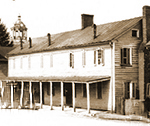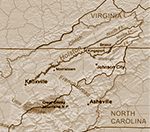Will of Henry Smith
In the name of God Amen. I Henry Smith of the County of Sullivan and the State of Tennessee being sick and weak of body but of sound and disposing mind and memory (thanks be to God) calling to mind the uncertainty of life and being desirous to dispose of all such worldly substance as it that pleased God to bless me with; I give and bequeath the same in the following manner and form that is to say-
In the first place to my wife Mary Smith I leave the plantation whereon I now living during her lifetime or widowhood allowing my two sons the privilege of farming and living on the said plantation by paying to their mother such a part of the proceeds of the same as will be sufficient to afford her a comfortable support so long as she remains my widow--likewise such part of the household furniture as may be necessary for her use, also I allow my two sons to find and keep their mother a good cow and such other stock as she may need during the time aforesaid.
After my wife's death or intermarriage I allow my son John Smith one half of the plantation whereon I live including a survey... said plantation on the upper end...both tracts to be divided in such a manner as may be most convenient and to the mutual advantage of him and his brother George Smith, also one half of a lot in the town of Blountville, one half of the waggon, one half of the farming utensils and Joiners tools to be at his immediate disposal, and at his mother's death or intermarriage one half of the balance of all my personal or moveable property.
And to my son George Smith at his mother's death or intermarriage I give one half of the plantation and survey aforesaid one half of the town lot, waggon, farming utensils and Joiners tools to be at his disposal at the time and manner aforesaid, together with one half of the balance of all my moveable estate at his mother's death or second marriage making him an equal sharer in all respects with his brother John.
And to my two daughters Mary Malone and Magdaline Cox I allow at their mother's death or intermarriage one hundred dollars each one half to be in money and the other half in good trade, also such a part of the household furniture as their mother in her lifetime may think proper to give them.
And lastly I do hearby constitute and appoint my two sons John Smith and George Smith Executors of this my last Will and Testament, hearby..ching all other or former wills or testaments, by me heretofore made. In witness whereof I have heareunto set my hand and seal this 22 day of December in the year of our Lord one thousand Eight hundred and twenty.
Signed sealed published and declared to be the last will and testament of the above named
In the presence of us
John Smith, Senr,
Isaac McKinely [McKinley]
The witness, John Smith, Sr. was perhaps a brother, and the "Sr." was likely used to designate him from Henry's son John.
Under Henry Smith's will his son John was to take care of the widow Mary Smith. On Nov. 19, 1827, an agreement was made by the widow Mary Smith and the son-in-law, Godfrey Cox, of the one part, and the son, John Smith, of the other part, that this obligation should pass to Godfrey Cox for a certain consideration. The instrument was witnessed by Abraham Gregg.
April 19, 1820, a deed for 60 acres lying in the forks of the Watauga and Holston Rivers, was made by John Smith to Godfry Cox, consideration $252.00, but this deed does not appear to have been recorded.



